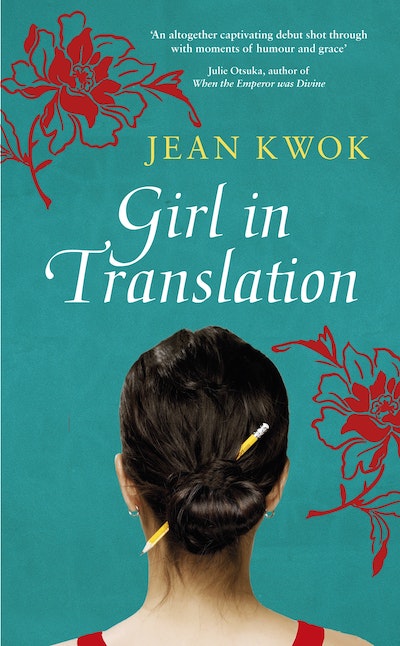Discussion points for Girl in Translation by Jean Kwok.
Girl in Translation introduced Jean Kwok as a fresh, exciting and compelling new voice. It’s an inspiring story about a young immigrant in America, a smart girl balancing schoolwork and factory labour, custom and desire, a girl who is forced at a young age to take responsibility for her family’s future, with decisions she may later regret. Take a look at our reading group notes below and make your next discussion one to remember.
Book Summary
What is it like to be surrounded every day by a language and culture you only half understand? How would it change your life?
When Kimberly Chang and her mother emigrate from Hong Kong to Brooklyn squalor, they speak no English and own nothing but debt. Kimberly’s talent for school does not pay the bills, and she quickly begins a double life, carefully hidden from the outside world: an exceptional student by day, she is a Chinatown sweatshop worker by evening and weekend. Disguising the most difficult truths of her life—her staggering poverty, the weight of her family’s expectations, her love for a factory boy who shares none of her talent or ambition—Kimberly learns to translate not just her language but herself back and forth between the two worlds she straddles.
Through Kimberly, we feel the shock of a new world and the everyday struggles and sacrifices of recent immigrants—and through her, we learn to understand how these experiences can ultimately shape a life and the choices one makes.
Like Kimberly Chang, author Jean Kwok emigrated from Hong Kong as a young girl, and she brings to the page the story of countless others who have been caught among the pressure to succeed in America, their duty to their family, and their own personal desires. Girl in Translation is a story of hardship and triumph, heartbreak and love, and all that gets lost in translation.
About the Author
Jean Kwok was born in Hong Kong and immigrated to Brooklyn as a child. She received her bachelor’s degree from Harvard and completed an MFA in fiction at Columbia. After working as an English teacher and Dutch-English translator at Leiden University in the Netherlands, she now writes full-time.
Reading Group Questions
- Throughout Girl in Translation, the author uses creative spelling to show Kimberly’s mis-hearing and misunderstanding of English words. How does the language of the novel evolve as Kimberly grows and matures? Do you see a change in the respective roles that English and Chinese play in the narrative as it progresses?
- The word translation figures prominently in the title of the novel, and learning to translate between her two languages is key to Kimberly’s ability to thrive in her new life. Does she find herself translating back and forth in anything other than language? Clothing? Priorities? Expectations? Personality or behaviour? Can you cite instances where this occurs, and why they are significant to the story as a whole?
- Kimberly has two love interests in the book. How are the relationships that Matt and Curt offer different? Why do you think she ultimately chooses one boy over the other? What does that choice say about her? Can you see a future for her with the other boy? What would change?
- In many ways Kimberly takes over the position of head of household after her family moves to New York. Was this change in roles inevitable? How do you imagine Ma feels about it? Embarrassed? Grateful? In which ways does Ma still fulfil the role of mother?
- Kimberly often refers to her father, and imagines how her life might have been different, easier, if he had lived. Do you think she is right?
- Kimberly’s friend Annette never seems to grasp the depths of Kimberly’s poverty. What does this say about her? What lesson does this experience teach Kimberly? Is Kimberly right to keep the details of her home life a secret?
- Kimberly believes that devoting herself to school will allow her to free her family from poverty. Does school always live up to her expectations? Where do you think it fails her? How does it help her succeed? Can you imagine the same character without the academic talent? How would her life be different? What would remain the same? Is Kimberly right to believe that all of her potential lies in her talent for school? Must qualities like ambition, drive, hope, and optimism go hand in hand with book smarts?
- Think about other immigrant stories. How is Kimberly’s story universal? How is it unique? How does Kimberly’s Chinese-American story compare to other immigrant stories? Would it change if she were from a different country or culture?
- Kimberly lives in extreme poverty. Was anything about her circumstances surprising to you? How has reading Girl in Translation affected your views of immigration? How can you apply these lessons in your community?












